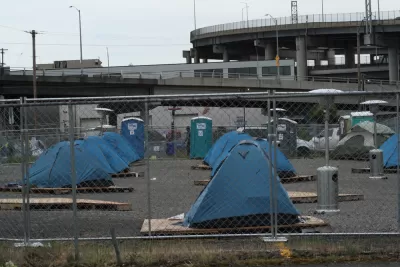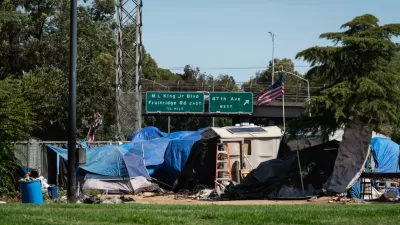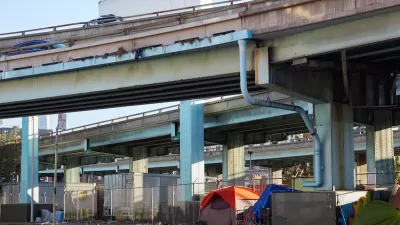Both West Coast cities are preparing to criminalize sleeping on public streets, claiming new shelter beds will provide enough resources for their unhoused populations.

In a housing brief on Next City, Roshan Abraham outlines two proposals aimed at further criminalizing homelessness in Portland, Oregon and Sacramento. The two cities are poised to ban sleeping on public streets if two proposals are approved by Portland’s city council and Sacramento voters.
The Portland proposal calls for increased shelter capacity and would force unsheltered people to move to city-run “alternate camping sites,” which would accommodate roughly 1,500 people, around half of the city’s unhoused population. “Oregon Live reports that the city council supports the resolutions, but getting them passed would not automatically lead to a camping ban or new shelter space, as resolutions are non-binding and the funding details would have to be worked out in the next budget cycle.”
In Sacramento, a ballot measure will let voters decide whether to make camping on public streets a misdemeanor. “The measure also allows “any resident harmed” by a violation of the measure to begin proceedings with the city to have someone removed.” If the measure passes, it may not be enforceable due to a clause that requires cooperation with the county.
Critics say cities are engaging in “legal gymnastics” to leverage new shelter space as “a pretext for criminalization,” with Abraham noting that “many cities rush to roll out shelter space prior to camping bans in order to comply with the 2019 decision in Martin vs. Boise, which barred jurisdictions from issuing public sleeping bans when there was not sufficient shelter space.”
FULL STORY: Housing In Brief: Portland & Sacramento Propose Citywide Camping Bans

Alabama: Trump Terminates Settlements for Black Communities Harmed By Raw Sewage
Trump deemed the landmark civil rights agreement “illegal DEI and environmental justice policy.”

Planetizen Federal Action Tracker
A weekly monitor of how Trump’s orders and actions are impacting planners and planning in America.

Why Should We Subsidize Public Transportation?
Many public transit agencies face financial stress due to rising costs, declining fare revenue, and declining subsidies. Transit advocates must provide a strong business case for increasing public transit funding.

Judge Orders Release of Frozen IRA, IIJA Funding
The decision is a victory for environmental groups who charged that freezing funds for critical infrastructure and disaster response programs caused “real and irreparable harm” to communities.

‘Clybourne Park’ Sets Stage for Housing Equity Discussions
Clybourne Park, a play exploring race, real estate, and community tensions, can set the stage for discussion on the lasting impacts of housing discrimination, gentrification, and the fight for affordability.

Understanding Road Diets
An explainer from Momentum highlights the advantages of reducing vehicle lanes in favor of more bike, transit, and pedestrian infrastructure.
Urban Design for Planners 1: Software Tools
This six-course series explores essential urban design concepts using open source software and equips planners with the tools they need to participate fully in the urban design process.
Planning for Universal Design
Learn the tools for implementing Universal Design in planning regulations.
Caltrans
Smith Gee Studio
Institute for Housing and Urban Development Studies (IHS)
City of Grandview
Harvard GSD Executive Education
Toledo-Lucas County Plan Commissions
Salt Lake City
NYU Wagner Graduate School of Public Service





























